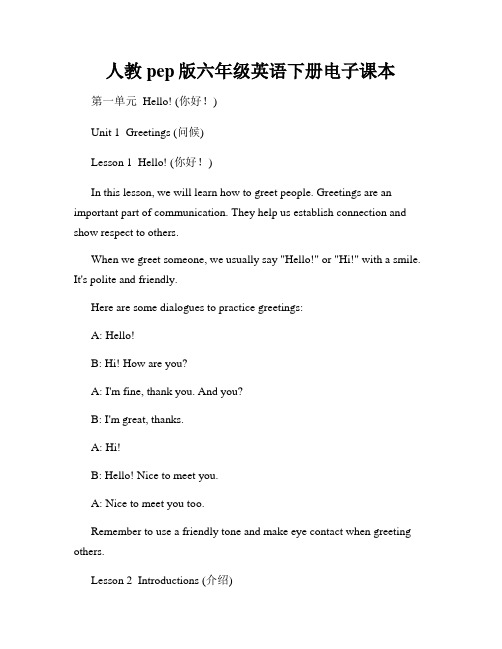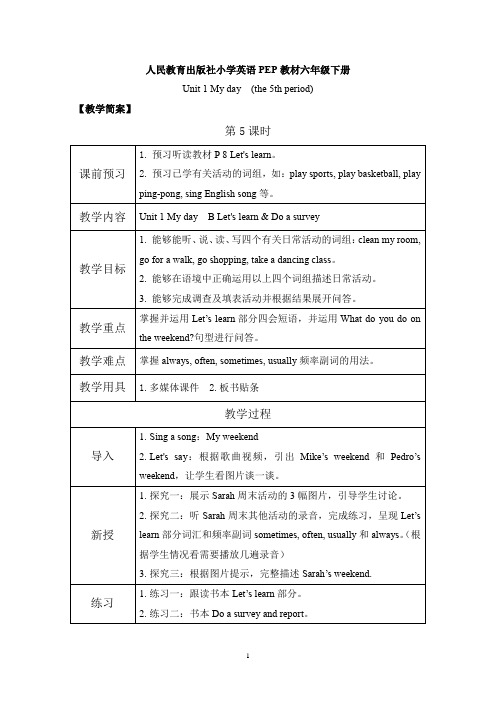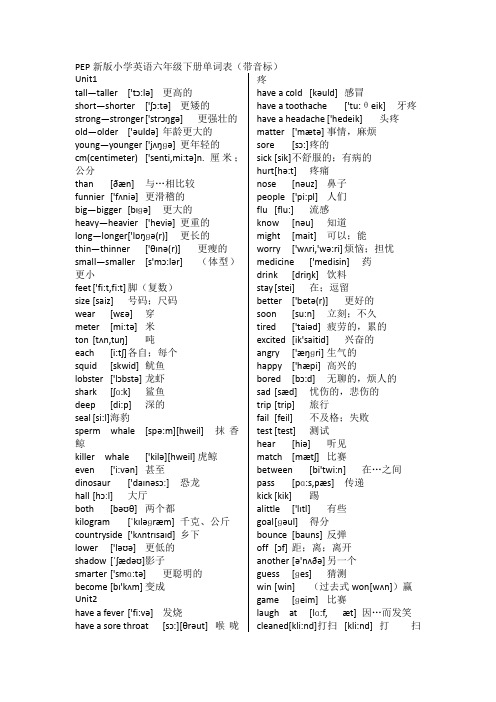小学六年级英语PEP小学英语六年级下册
PEP小学六年级英语下册复习语法知识及配套习题

小学英语语法及习题一、名词复数规则1.一般情况下,直接加-s,如:book-books, bag-bags, cat-cats, bed-beds2.以s. x. sh. ch结尾,加-es,如:bus-buses, box-boxes, brush-brushes, watch-watches3.以“辅音字母+y”结尾,变y为i, 再加-es,如:family-families, strawberry-strawberries4.以“f或fe”结尾,变f或fe为v, 再加-es,如:knife-knives5.不规则名词复数:man-men, woman-women, policeman-policemen, policewoman-policewomen, mouse-micechild-childrenfoot-feet,.tooth-teethfish-fish, people-people, Chinese-Chinese, Japanese-Japanese写出下列各词的复数I _________him _________this ___________her哇库资源网______watch _______child _______photo ________diary ______day________ foot________ book_______ dress________tooth_______ sheep ______box_______ strawberry _____thief _______yo-yo ______ peach______ sandwich ______man______ woman_______paper_______ juice___________ water________ milk________ rice__________tea__________二、一般现在时一般现在时基本用法介绍【No. 1】一般现在时的功能1.表示事物或人物的特征、状态。
人教pep版六年级英语下册电子课本

人教pep版六年级英语下册电子课本第一单元 Hello! (你好!)Unit 1 Greetings (问候)Lesson 1 Hello! (你好!)In this lesson, we will learn how to greet people. Greetings are an important part of communication. They help us establish connection and show respect to others.When we greet someone, we usually say "Hello!" or "Hi!" with a smile. It's polite and friendly.Here are some dialogues to practice greetings:A: Hello!B: Hi! How are you?A: I'm fine, thank you. And you?B: I'm great, thanks.A: Hi!B: Hello! Nice to meet you.A: Nice to meet you too.Remember to use a friendly tone and make eye contact when greeting others.Lesson 2 Introductions (介绍)In this lesson, we will learn how to introduce ourselves and others. Introductions help us get to know each other better.When introducing yourself, you can say:- My name is [Your Name].- I am [Your Age].- I am from [Your City/Country].- I like [Your Hobby].- Nice to meet you!When introducing others, you can say:- This is [Person's Name].- He/She is [Person's Age].- He/She is from [Person's City/Country].- He/She likes [Person's Hobby].- Nice to meet you!Here are some examples:A: Hello! My name is Tom.B: Hi Tom! I'm Emily.A: Nice to meet you, Emily.B: Nice to meet you too, Tom.A: This is my friend, Lisa.B: Hello Lisa! Nice to meet you.A: Nice to meet you too.Remember to speak clearly and confidently when introducing yourself and others.Lesson 3 Goodbye! (再见)In this lesson, we will learn how to say goodbye. Saying goodbye politely shows respect to others and ends the conversation politely.Here are some common ways to say goodbye:- Goodbye!- See you later!- Bye-bye!- Take care!- Have a nice day!Here are some examples:A: Goodbye!B: Goodbye! See you tomorrow.A: See you tomorrow, bye!A: Bye-bye!B: Bye-bye! Have a great day.A: Thank you, you too!Remember to wave or give a friendly smile when saying goodbye.That's all for Unit 1. Practice your greetings, introductions, and goodbyes with your friends and family. Remember to be polite and friendly. See you in the next unit!。
人民教育出版社小学英语PEP教材六年级下册

人民教育出版社小学英语PEP教材六年级下册Unit 1 My day (the 5th period)【教学简案】第5课时【教学详案】课前预习:1.预习听读教材P 8 Let's learn。
2.预习已学有关活动的词组,如:play sports, play basketball, play ping-pong, sing English song等。
教学内容:Unit 1 My day B Let's learn & Do a survey教学目标:1. 能够能听、说、读、写四个有关日常活动的词组:clean my room, go for a walk, go shopping, take a dancing class。
2. 能够在语境中正确运用以上四个词组描述日常活动。
3. 能够完成调查及填表活动并根据结果展开问答。
教学重点:掌握并运用Let’s learn部分四会短语,并运用What do you do on the weekend?句型进行问答。
教学难点:掌握always, often, sometimes, usually频率副词的用法。
教学用具:1.多媒体课件 2. 板书贴条教学过程:一、Warming up1. Sing a song:My weekend2. Let’s say:根据歌曲视频,引出Mike’s weekend和Pedro’s weekend,让学生看图片谈一谈。
T: In the video, we sang about Pedro and Mike’s weekend. Look at this picture. If you are Mike, can you talk about his weekend?S: I often clean my room on the weekend. (板书often)S: I sometimes go shopping on the weekend. (板书sometimes)T: What about Pedro’s weekend?(指着Pedro的图片提问)S: I usually play football and play basketball on the weekend.(板书usually)T: Right. We can also say Pedro usually plays sports on the weekend.设计意图:歌曲活跃课堂气氛,营造轻松学习氛围,吸引学生的注意力,为学生学习课文词组和语言表达做铺垫;以歌曲中人物活动作为引子,帮助学生回顾所唱的内容,为后面学习相关周末活动做铺垫;其次,运用图片中的星级标注引出3个频率副词,将抽象内容具体化,有助于学生对虚词的理解。
人教pep版六年级下册英语全册重要知识点总结

人教pep版六年级下册第一单元单元重要知识点总结四会单词:tall—taller更高的short—shorter 更矮的strong—stronger更强壮的small—smaller (体型)更小的old—older 年龄更大的young—younger 更年轻的big—bigger更大的heavy—heavier 更重的long—longer 更长的thin—thinner 更瘦的四会句型:How tall are you? 你有多高?I’m 164 cm tall. 我164 厘米高。
You’re shorter than me. 你比我矮。
You’re 4 cm taller than me.你比我高4厘米。
How heavy are you? 你有多重?I’m 48 kg. 我48千克。
应该掌握的知识点:1.表示两者之间有所比较时,句子中的形容词要用比较级形式。
形容词变为比较级的变化规则:(1)一般情况下,在形容词的词尾直接加er。
如: tall—taller short—shorter.(2)以字母e结尾的形容词,在词尾直接加r,如:nice—nicer late—later(3)以重读闭音节结尾,且结尾只有一个辅音字母的词,先双写这个辅音字母,再加er.如:big—bigger thin—thinner fat—fatter(4)以辅音字母加y结尾的双音节形容词,先变y为i , 再加er。
如:easy—easierheavy—heavier funny—funnier.形容词比较级的变化口诀:原级变为比较级,通常er加上去。
若是结尾辅元辅,辅音双写要牢记。
辅音加y结尾时,把y变i 是必须。
原级若以e结尾,直接加r不后悔。
2.部分形容词比较级的不规则变化:good—better well—better bad—worsebadly—worse many—more much—more little—less far—farther3.同义句:How tall are you?=What’s your height?How heavy are you?=What’s your weight?4.以How开头的问句(仅限小学阶段):How are you? 问身体状况。
PEP人教版小学英语六年级下册单词表(含音标)

40
fixed
[fɪkst]
adj.固定的,不变的,确定的动词fix的过去式和过去分词
41
broken
['brəʊkən]
a.弄坏了的break的过去分词v.打破(断,碎);损坏,撕开
42
lamp
[læmp]
n.灯,油灯;光源
43
loud
[laud]
a.大声的;响亮的;喧闹的
44
enjoy
24
stayed
[steid]
v.停留,停止( stay的过去式和过去分词);继续处于某种状态
25
washed
[wɒʃt]
.adj.洗过的v.洗( wash的过去式和过去分词);洗涤;冲;(向着某一方向)流动
26
had
[hæd]
vt.有;使(have的过去式和过去分词)
27
had a cold
[hævəkəuld]
n.旅行,旅程v.绊倒;失误
90
woke
[wəʊk]
.v.醒( wake的过去式);唤醒;唤起(记忆);使再次感觉到
91
dream
[dri:m]
n.梦;梦想vt.做梦;梦想
感冒,受凉,伤风
28
slept
[slept]
v.睡觉(sleep的过去式和过去分词)
29
read
[ri:d]
v.读;朗读(过去式:read,过去分词:read)
30
saw
[sɔ:]
vt.看见(see的过去式)
31
last
[lɑ:st]
a.最近刚过去的;最后的ad.最近刚过去;最后地n.最后
PEP新版小学英语六年级下册单词表(带音标)

PEP新版小学英语六年级下册单词表(带音标)Unit1tall—taller ['tɔ:lə] 更高的short—shorter ['ʃɔ:tə] 更矮的strong—stronger ['strɔŋgə] 更强壮的old—older ['əuldə] 年龄更大的young—younger ['jʌŋɡə] 更年轻的cm(centimeter) ['senti,mi:tə]n. 厘米;公分than [ðæn] 与…相比较funnier ['fʌniə] 更滑稽的big—bigger [bɪɡə] 更大的heavy—heavier ['heviə] 更重的long—longer['lɒŋɡə(r)] 更长的thin—thinner ['θɪnə(r)] 更瘦的small—smaller [s'mɔ:lər] (体型)更小feet ['fi:t,fi:t] 脚(复数)size [saiz] 号码;尺码wear [wεə] 穿meter [mi:tə] 米ton [tʌn,tuŋ]吨each [i:tʃ] 各自;每个squid [skwid] 鱿鱼lobster ['lɔbstə] 龙虾shark [ʃɑ:k] 鲨鱼deep [di:p] 深的seal [si:l] 海豹sperm whale [spə:m][hweil] 抹香鲸killer whale ['kilə][hweil] 虎鲸even ['i:vən] 甚至dinosaur ['daɪnəsɔː]恐龙hall [hɔːl]大厅both [bəʊθ]两个都kilogram [ˈkɪləɡræm] 千克、公斤countryside ['kʌntrɪsaɪd] 乡下lower ['ləʊə] 更低的shadow [ˈʃædəʊ]影子smarter ['smɑ:tə] 更聪明的become [bɪ'kʌm] 变成Unit2have a fever ['fi:və] 发烧have a sore throat [sɔ:][θrəut] 喉咙疼have a cold [kəuld] 感冒have a toothache ['tu:θeik] 牙疼have a headache ['hedeik] 头疼matter ['mætə] 事情,麻烦sore [sɔ:] 疼的sick [sik] 不舒服的;有病的hurt [hə:t] 疼痛nose [nəuz] 鼻子people ['pi:pl] 人们flu [flu:] 流感know [nəu] 知道might [mait] 可以;能worry ['wʌri,'wə:ri] 烦恼;担忧medicine ['medisin] 药drink [driŋk]饮料stay [stei] 在;逗留better ['betə(r)] 更好的soon [su:n] 立刻;不久tired ['taiəd] 疲劳的,累的excited [ik'saitid] 兴奋的angry ['æŋɡri] 生气的happy ['hæpi] 高兴的bored [bɔ:d] 无聊的,烦人的sad [sæd] 忧伤的,悲伤的trip [trip] 旅行fail [feil] 不及格;失败test [test] 测试hear [hiə] 听见match [mætʃ] 比赛between [bi'twi:n] 在…之间pass [pɑ:s,pæs] 传递kick [kik] 踢alittle ['lɪtl] 有些goal [ɡəul] 得分bounce [bauns] 反弹off [ɔf] 距;离;离开another [ə'nʌðə] 另一个guess [ɡes] 猜测win [win] (过去式won[wʌn])赢game [ɡeim] 比赛laugh at [lɑ:f, æt] 因…而发笑cleaned[kli:nd]打扫[kli:nd] 打扫clean过去式stayed [steɪd] 待、停留stay的过去式washed [wɔʃt] 洗,洗涤(wash的过去watched(watch的过去式[wɒtʃt]看的过去式had(have的过去式) [hæd] 患病、有、吃、喝、上课had a cold [hæd] 感冒slept(sleep的过去式) [slept] 睡觉(sleep的过去式read [red] 读书过去式saw [sɔː]s ee的过去式看last [lɑːst]上一个、最后的yesterday [ˈjestədɪ;-deɪ] 昨天before [bɪˈfɔ:(r)] 之前drank(drink的过去式)[dræŋk]喝show [ʃəʊ] 表演magazine [mægə'ziːn杂志better(good,well的比较级) ['betə]更好的faster [fɑ:stə(r)] 更快的hotel [həʊˈtel] 旅馆、酒店fixed(fix的过去式) [fɪkst] 修理broken ['brəʊk(ə)n] 破的,坏的lamp [læmp] 灯、台灯loud [laʊd] 大声的enjoy [ɪnˈdʒɔɪ] 喜爱、享受stay [steɪ] 待、停留Unit3watch—watched [wɒtʃt] 看wash—washed [wɔʃt] 洗play—played [pleɪd] 玩visit—visited ['vɪzɪtid] 看望do—did [did] 做lastweekend [lɑ:st]['wi:kend] 上一个周末go—went [went] 去go to a park—went to a park 去公园go swimming—went swimming ['swɪmɪŋ]去游泳go fishing—went fishing ['fɪʃɪŋ]去钓鱼read—read [ri:d] 读go hiking—went hiking [haɪkɪŋ]去郊游study(过去式studied)['stʌdi] 学习tongue twister [tʌŋ]['twistə] 绕口令fiy [flai] 飞flew [flu:] 飞(过去式)return [ri'tə:n]] 送回;归还swim [swim] 游泳swam [swæm] 游泳(过去式)went [went] 去(过去式)camp [kæmp] 野营went camping [went][kæmpɪŋ]去野营(过去式)fish [fɪʃ] 钓鱼、鱼、鱼肉went fishing [went][fɪʃɪŋ]去钓鱼(过去式)rode [rəʊd] 骑(过去式)ride [raɪd] 骑hurt [hɜːt]伤害ate [et; eit] 吃(过去式)took [tu:k] 拍照(过去式)take [teɪk] 拍照took pictures [tu:k]['pɪktʃəz] 照相bought [bɔːt]买buy [baɪ] 买gift [gɪft] 礼物fell [fel] 跌倒fall [fɔːl]跌倒off [ɒf] 脱落、离开Labour Day ['leɪbə][deɪ] 劳动节mule [mjuːl]骡子Turpan ['tuə'pɑ:n] 吐鲁番could [kəd; kʊd] 可以;能;可能;can的过去式till [tɪl] 直到…时beach [biːtʃ] 海滩;海滨basket ['bɑːskɪt] 篮;一篮part [pɑːt]角色;部位lick [lɪk] 舔licked [lɪkt] 舔laugh [lɑːf]笑;嘲笑luaghed [lɑːft]笑;嘲笑Unit4learn Chinese [lə:n][tʃaɪniːz]学汉语learned Chinese [lə:nd][tʃaɪniːz]学汉语sing and dance [siŋ][dɑ:ns,dæns]唱歌和跳舞sang and danced [sæŋ][dɑ:nst]唱歌和跳舞eat good food [i:t] 吃好吃的食物ate good food [et,eit] 吃好吃的食物climb /klaim/ 爬climbed /klaimd/ 爬have [hæv] 有,吃,喝,上…课had [hæd] 有,吃,喝,上…课buy presents [bai][pri'zents] 买礼物bought presents [bɔ:t][pri'zents] 买礼物row a boat [rəu][bəut] 划船rowed a boat [rəud][bəut] 划船see elephant [si:]['elifənt] 看大象saw elephant [sɔ:]['elifənt] 看大象go skiing—[gəʊ]['ski:ɪŋ]去滑雪went skiing ['ski:ɪŋ]去滑雪go ice-skating [gəʊ]['skeɪtɪŋ]去滑冰went ice-skating ['skeɪtɪŋ]去滑冰how [haʊ] 怎么,如何get [ɡet] 到达got [ɡɒt] 到达last [lɑ:st] 上一个的,仅余的cousin ['kʌzn] 堂(表)兄弟、姐妹relax [ri'læks] 放松prepare [pri'pεə] 准备dining hall [daɪnɪŋ][hɔːl]饭厅grass [grɑːs]草;草地gym [dʒɪm] 体育馆ago [ə'gəʊ] 以前;过去的cycling ['saɪklɪŋ]骑自行车go cycling [gəʊ]['saɪklɪŋ]骑自行车ice-skate [aɪs][skeɪt] 滑冰badminton ['bædmɪnt(ə)n 羽毛球运动star [stɑː]星;明星easy ['iːzɪ] 容易的;舒适的look up [luk ʌp] 查找Internet ['ɪntənet] 因特网different [ˈdɪfrənt] 不同的active ['æktɪv] 积极的;活跃的race [reɪs] 比赛nothing ['nʌθɪŋ]没什么;毫不think [θɪŋk]想;思索thought [θɔːt]思想;思考felt [felt] 感觉feel的过去式cheetah ['tʃiːtə] 非洲猎豹trip [trɪp] 旅行;绊倒woke [wəʊk] 唤醒;激发wake [weɪk] 醒来;唤醒dream [driːm]梦想;做梦。
PEP小学英语六年级下册全册教案
新版PEP小学英语六年级下册全册教案Unit 1 How Tall Are You?单元学情分析本课时的教学重难点在于让学生学会用英语的比较级,并能熟练的将其运用于实际生活中,询问身边的人或者事物的年龄、身高、重量以及长度并用比较级的句型来回答。
本课时的主要语言项目是用英语表述自己的身高和体重,通过A部分五个英语词汇的掌握,把新授词汇融入到新句型当中。
教材在Let's do部分设计了三位学生的身高比较,让学生通过做动作或实际比较可以很快理解并熟练掌握这些相关内容,达到能实际运用的目的。
六年级的学生对英语学习兴趣整体有所下降,两极分化比较严重。
所以本学期应做好后进生的转化工作。
教师应该面向全体学生,以学生的发展为宗旨,始终把激发学生的学习兴趣放在首位,注意分层教学,引导学生端正学习态度,掌握良好的学习方法,培养学生良好的学习习惯。
单元教学目标:知识与技能1、通过第一单元的学习,学生能对身体或事物的高矮、大小、重轻、长短进行描述和问答。
2、四会(听、说、读、写)掌握的单词有:taller, shorter, older, younger, stronger, thinner, bigger, smaller, longer, heavier等。
四会掌握的句子有:How tall are you? I’m 164 cm tall. You’re shorter than me. You’re 4cm taller than me. How heavy are you? I’m 48kg. I’m thinner than you, and shorter.3、能够运用计量单位kg和m,能根据所给的数据,运用比较词than进行事物或身体的比较或描述。
课时教学设计课题:Unit 1 (第1课时)教学目标:知识与能力:1、能听、说、读、写taller、longer、older、younger 、shorter,than 单词,发音准确。
pep小学英语六年级下册unit1作文
pep小学英语六年级下册unit1作文全文共3篇示例,供读者参考篇1Unit 1 My summer vacationMy Summer VacationSummer vacation is a time that all students look forward to. It's a time to relax, have fun, and explore new things. This year, my summer vacation was a memorable one that I will never forget.I started my summer vacation by going on a family trip to the beach. We spent our days soaking up the sun, swimming in the ocean, and building sandcastles. The beach was so beautiful and peaceful, and I enjoyed every moment of it.After the beach trip, I spent some time with my friends. We went to the amusement park, went hiking, and had sleepovers. It was great to catch up with my friends and create wonderful memories together.One of the highlights of my summer vacation was attending a summer camp. It was a week-long camp where I learned newskills, made new friends, and had tons of fun. We went kayaking, rock climbing, and even had a campfire with s'mores. It was an experience that I will never forget.Towards the end of my summer vacation, my family and I went on a road trip. We visited national parks, went on hikes, and saw breathtaking views. It was amazing to see the beauty of nature and spend quality time with my family.Overall, my summer vacation was filled with adventures, laughter, and new experiences. It was a time of relaxation and excitement, and I will cherish the memories forever. I can't wait for the next summer vacation to come!篇2Unit 1: Welcome back to schoolIn the first unit of PEP English Grade 6, students will welcome back to school after a long summer vacation. They will learn new expressions, vocabulary, and grammar points to help them communicate in English more effectively. Here are some key points covered in this unit:1. Greetings and introductions: Students will learn how to greet their friends and teachers in English, as well as introduce themselves in a simple and clear manner.2. Classroom objects: Students will learn the names of various objects found in the classroom, such as desks, chairs, whiteboards, etc.3. School subjects: Students will learn the names of different school subjects, such as math, science, English, etc.4. Daily routines: Students will learn how to talk about their daily routines, such as waking up, going to school, doing homework, etc.5. Present simple tense: Students will learn how to form and use the present simple tense to talk about habits, routines, and general truths.In this unit, students will engage in various activities, such as role-plays, games, songs, and group discussions, to practice their English skills in a fun and interactive way. By the end of the unit, students will be able to communicate with confidence in everyday situations and express themselves more effectively in English.Overall, Unit 1 of PEP English Grade 6 provides a solid foundation for students to build their English language skills and prepares them for more advanced topics in the following units.Students will not only improve their English proficiency but also develop a deeper appreciation for the language and culture.篇3Unit 1 in the sixth-grade English textbook of PEP for primary school students is all about "My School Life". In this unit, students learn vocabulary related to school life, such as subjects, activities, routines, and school facilities. They also practice using simple present tense to describe their daily routines and express opinions.In this unit, students are encouraged to talk about their own school life and compare it with others. They also learn to write short paragraphs to describe their school, teachers, classmates, and favorite subjects.Here is a sample essay inspired by Unit 1:"My School Life"My school is a beautiful place with colorful walls and big windows that let the sunlight in. There is a playground where we can play during breaks, and a library filled with books that we can borrow. Our classrooms are cozy with desks and chairs neatly arranged, and a whiteboard where our teacher writes important information.Every day, I go to school by bus with my friends. We chat and laugh along the way, excited for the day ahead. Our school day starts at 8:00 in the morning and ends at 4:00 in the afternoon. We have six classes each day, including Chinese, English, math, science, art, and music. I like art and music the most because I can be creative and express myself through drawings and songs.Our teachers are kind and patient, always ready to help us learn and grow. They use fun activities and games to make learning enjoyable and engaging. My classmates are also friendly and supportive, we help each other with homework and projects, and we have fun together during recess.Overall, I love my school life. It is a place where I can learn, play, and make friends. I am grateful for the opportunities and experiences that my school provides, and I look forward to each new day of learning and growing.This essay reflects the vocabulary and grammar structures taught in Unit 1 of the sixth-grade PEP English textbook. Students can use this sample as a model to write their own compositions about their school life, incorporating the new vocabulary and grammar they have learned. By practicing writing, students can strengthen their language skills and improve their ability to express themselves in English.。
(完整版)PEP人教版小学英语六年级下册教材解析
吉安县中小学教师说教材活动全局把握温故知新——浅谈我对六年级英语下册教材的理解吉安县实验小学彭建林在我们的日常教学活动中,明确目标,吃透教材,选择合适的策略是非常重要的,在我们小学英语教学中也是一样。
今年我继续担任我校六年级英语的教学工作,在此,说一说我对人教版小学六年级上册英语教材的理解,与各位同仁探讨。
一、紧扣课程标准,了解教材特点。
1.《英语课程标准》对小学阶段应达到的目标作了明确的阐述,我们小学六年级应该达到的应该是二级,其要求是:对英语学习有持续的兴趣和爱好。
能用简单的英语互致问候、交换有关个人、家庭和朋友的简单信息。
能根据所学内容表演小对话或歌谣。
能在图片的帮助下听懂、读懂并讲述简单的故事。
能根据图片或提示写简单的句子。
在学习中乐于参与、积极合作、主动请教。
乐于了解异国文化、习俗。
我们的这一册教材就是人民教育出版社根据国家教育部颁布的《英语课程标准》编订的以小学三年级为起始年级的小学英语教材的最后一册课本。
通过完成此册课本的学习,学生的英语水平要达到《英语课程标准》规定的基础教育阶段英语课程的二级目标。
因此,本册教材的教学对学生在小学毕业时能否达到教学目标规定的要求有举足轻重的作用。
2.本套教材的编写特点是:*强调语言运用(如let’s do、let’s sing等)*注重能力培养(Group work、Let’s check等)*突出兴趣出发(卡通插图、图文并茂)*重视双向交流(融合中西方文化知识)*融合学科内容(贯穿自然科学、社会文化、语言艺术领域)*重视灵活扩展(选学C部分)*实现整体设计(三至六年级系统编排)3.在编写上,本套教材是这样安排的:(1)、全册共有4个单元,两个recycle是针对小学所有教学内容的总体复习单元。
(2)、新的教学内容较少,12周的时间完成新授单元的教学,2周的时间对这四个单元进行复习巩固,阶段复习;(3)、语言点较为集中,Unit One 是比较级,Unit 3 , Unit 4 是过去时,是本册的难点。
PEP小学英语六年级下册复习教案
PEP小学英语六年级下册复习教案篇一:2015新版PEP英语六年级下册教案Unit 1How tall are you ?单元教学目标1、能力目标(1)能听懂会说认读本单元关于形容词比较级的单词。
(2)能听、说、读、写Let’s learn中黑体部分的内容和Read and write中要求的内容。
(3)能用目标语言完成本单元的任务型活动。
(4)能学说Chant一首和Song一首。
(5)了解ei/ai/oi,p/b,t/d的发音特点,并能试着拼读简单的规则词。
知识目标(1)能听、说、读、写单词及短语:taller stronger older younger shorter heaiver thinner longer bigger smaller 句型:How tall are you ?I’m 164cm.You’re shorter than me. You’re 4cm taller than me .How heavy areyou ?I’m 48 kg. I’m thinner than you , and shorter .(2)能够听、说、读Part A、Part B部分Let’s learn、Let’s talk中的单词和句子。
(3)了解Story time 、Good to know等部分的内容。
(4)了解字母ei/ai/oi,p/b, t/d在单词中的基本读音。
情感、策略、文化等有关目标(1)情感态度:培养和保持学生学习英语的积极态度和学习信心,引导学生养成良好的英语学习习惯。
(2)学习策略:加强学生英语学习策略的培养,为学生的终身学习奠定基础。
(3)文化目标:培养学生文化意识,帮助学生养成良好的日常行为习惯。
单元教学课时安排:六课时Unit 1How tall are you ?第一课时一、教学目标与要求1、能够听、说、认读本课时的主要词组:taller stronger older younger shorter。
- 1、下载文档前请自行甄别文档内容的完整性,平台不提供额外的编辑、内容补充、找答案等附加服务。
- 2、"仅部分预览"的文档,不可在线预览部分如存在完整性等问题,可反馈申请退款(可完整预览的文档不适用该条件!)。
- 3、如文档侵犯您的权益,请联系客服反馈,我们会尽快为您处理(人工客服工作时间:9:00-18:30)。
illness
• have a cold • have a toothache • have a headache • have a sore throat 补充:have an earache, have a stomachache
五、教法建议
• 功能结构,同时兼顾。 功能结构,同时兼顾。 • 听、说、读、写,全面训练。 全面训练。 • 阅读教学:在教师启发与指导下的培养 阅读教学: 学生的自主学习与合作能力。 学生的自主学习与合作能力。 • 语音教学:在复习单元音的基础上进行 语音教学: 双元音的认读;教会学生查阅词典, 双元音的认读;教会学生查阅词典,使 用词典。 用词典。
• 六年级上册48个音标已经全部出现基 本学习。六年级下册:要求学生通过 拼读进一步掌握双元音。 • 教学目标:通过了解字母组合的发音, 掌握双元音的拼读,能流利地朗读课 本上所举的例词。应教给学生一些拼 读单词的技巧。
总复习教学建议
• • • • • • 精心制定复习方案 精讲多练, 精讲多练,培养学生综合能力 贯穿评价, 贯穿评价,课堂课外结合 查漏补缺, 查漏补缺,防止两极分化 重视字母的复习, 重视字母的复习,打好基础的基础 注重词汇教学复习方法
其它: 其它:
1、能完成1个手工制作。 能完成1个手工制作。 2、能听懂、会唱6首歌谣。 能听懂、会唱6首歌谣。 3、能听懂、会唱6首歌曲。 能听懂、会唱6首歌曲。 4、能完成4个自我评价活动。 能完成4个自我评价活动。 5、能理解6个幽默小故事。 能理解6个幽默小故事。 6、能了解6项简单的中西方文化知识。 能了解, played,lived, used, stopped, planned, studied, carried
• 规则动词过去式加“ed”后的发音规则 规则动词过去式加“ed 后的发音规则
welcomed, moved, finished, helped, wanted, started
weekend activities outdoor activities general revision general revision
四、教法要点
Unit One 比较级的词汇,可以通过听听做 比较级的词汇, 做的活动,复习已学过的形容词 tall, 做的活动, short, strong, old, young,通过指认比较, 通过指认比较, 通过指认比较 在学生理解的基础上,呈现新词比较级, 在学生理解的基础上,呈现新词比较级, 让学生观察得出其中的变化规律。 让学生观察得出其中的变化规律。教师只 需讲解发音的要领, 需讲解发音的要领,就可以放手让学生自 己拼读速记。 己拼读速记。
• 语言点复习: 语言点复习: 旅行---复习六年级上册: ---复习六年级上册 Recycle 1: 旅行---复习六年级上册:be to结构 一般过去时、 结构、 going to结构、一般过去时、方位词及 问路 告别晚会---复习can/can ---复习can/can’t, Recycle 2: 告别晚会---复习can/can t, to结构 结构, be going to结构,there be 结构和电 话用语,现在进行时,一般进行时, 话用语,现在进行时,一般进行时,第 三人称单数功能结构和语法
• 学会运用及发音
--Do you often read newspapers? ---Yes, I read yesterday evening.
其他词汇
Units of length • cm (centimeters) 厘米 • mm (millimeters) 毫米 • m (meters) 米 • km (kilometers) 公里 • ft (feet) Units of weight kg ( kilogram) g (grams) t/tn (tons)
•Thank you
更多资源
更多资源
初三语文 初三英语 初三数学 初三物理 初三化学 初三政治 初三历史 初三地理 初三生物
六、提示
• 六年级下册教师用书已从三年级— —六年级按词的类别归纳好(P121)。 在平常的教学中可有意识给学生进 行复习听写,让学生养成一种记忆 单词的良好习惯。 • 建议翻看学习现在的初中课程,做 好初小衔接工作。
三、各单元内容
Title Unit 1 Unit 2 Unit 3 Unit 4 Unit 5 Unit 6 How tall are you? Topic height, length, weight illness, feeling
What's the matter, Mike? Last weekend My holiday Let's take a trip! A farewell party
• Unit Three 是学习动词过去式的规则变化。可 是学习动词过去式的规则变化。 以通过两个关键性的时间短语on weekend和 以通过两个关键性的时间短语on the weekend和 last weekend, 介绍一些平时周末做的一些活动 和上个周末做的活动, 和上个周末做的活动,把动词原形和相应的过去 式进行比较,让学生观察出规律。教师需示范式进行比较,让学生观察出规律。教师需示范ed的发音 让学生利用发音规律拼读,巧记单词。 的发音, ed的发音,让学生利用发音规律拼读,巧记单词。 部分是动词规则变化:动词直接加ed ed; A部分是动词规则变化:动词直接加ed; 部分是动词的不规则的变化: B部分是动词的不规则的变化: go—went read read read—read do did do—did go went
• Unit Four出现了含有不规则动词过去式的词组。 Four出现了含有不规则动词过去式的词组 出现了含有不规则动词过去式的词组。 不规则动词有:take—took sing—song 不规则动词有:take took sing song see---saw eat—ate buy—bought see--saw eat ate buy bought 两个单元中出现了went 引导的短语: 两个单元中出现了went 引导的短语: went to school / went to bed / went to the zoo / went to the park / went to the cinema / went to the bookstore / went swimming / went home / went hiking / went fishing
二、全册教学目标
能力目标: 能力目标: 学会表达以下话题并完成任务:长度、高度、 学会表达以下话题并完成任务:长度、高度、 重量、身体状况、感情、周末、假期活动。 重量、身体状况、感情、周末、假期活动。 知识目标: 知识目标: 能够听、 61个短语和单词 个短语和单词, 能够听、说、读、写61个短语和单词,7组 句型和4个单句; 句型和4个单句; 复习整个小学阶段的学习内容。 复习整个小学阶段的学习内容。
2006年2月
小学英语》 《PEP小学英语》六年级下册 小学英语 教材分析
一、教材编排的改变
1、全册共有4个单元,两个recycle是针对 全册共有4个单元,两个recycle是针对 全册共有 recycle 小学所有教学内容的总体复习单元。 小学所有教学内容的总体复习单元。 2、新的教学内容较少,8周的时间完成新授 新的教学内容较少, 单元的教学, 单元的教学,2周的时间对这四个单元进行 复习巩固,阶段复习; 复习巩固,阶段复习; 语言点较为集中, 是比较级, 3、语言点较为集中,Unit One 是比较级, 是过去时,是本册的难点。 Unit 3 , Unit 4 是过去时,是本册的难点。
